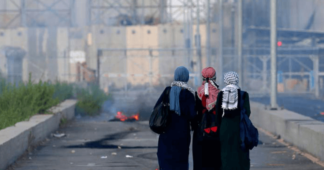By
20 November 2023
Editor’s note: This article was originally submitted to the London Schools of Economics’ British Politics and Policy blog. Although the author is a professor at the LSE, the article was rejected for publication. A statement from the LSE can be read at the end of this article.
The Israeli-Palestinian conflict in recent weeks has given salience to the question of what constitutes “extremism” in Britain.
Conservative government politicians have challenged senior police officers to clamp down on pro-Palestine protesters and supporters, and have criticized the London Metropolitan Police in particular for being too soft on “extremism” and being too reticent to use counter-terrorism and other criminal laws to arrest and prosecute those suspected of “extremism.”
The commander of the Metropolitan Police Mark Rowley has joined government demands for a review of laws on terrorism and hate crimes, calling for greater clarity and an expanded definition of “extremism.” Equally, he has resisted – so far – the enormous political pressure from the Conservative government and pro-Israel lobby groups to ban protests and expressions of anti-Israel sentiment.
An important context here is that about 80 percent of Conservative MPs are members of the pressure group Conservative Friends of Israel.
The expansion of that lobby has been nurtured by Israel over recent years. This explains the almost unanimous pro-Israel positioning of the current Conservative government and its mirroring of the policy of the Israeli state itself by fusing criticism of the Israeli state with anti-Semitism, and attempts to ban anti-Israeli political expression.
Suella Braverman – home secretary until her recent dismissal – is one of the leading pro-Israel voices within the Conservative Party in the effort to Israelize policy approach to civil liberties in the UK.
Her recent article in The Times takes the issue of extremism in a new direction by linking the mass popular support for Palestinians and antipathy to Israel directly to the UK’s past experience of dealing with violence and extremism in Northern Ireland.
What precisely are the lessons to be drawn from extremism in Northern Ireland? Could the Conservative government’s support for Israel itself be a form of “extremism”?
Complicity in the crime of apartheid
First, as regards Conservative support for Israel, numerous respected international organizations in the human rights field have declared Israel to be an apartheid state, including Human Rights Watch, Amnesty International, and Israel’s own leading human rights advocacy organization B’Tselem.
Two successive United Nations special rapporteurs on the situation of human rights for Palestinians in the Occupied Territories, have produced detailed reports setting out the apartheid nature of the Israeli state: Michael Lynk (Canada) in 2022, and Francesca Albanese (Italy) in 2023. Apartheid is a crime against humanity under the Rome Statute of the International Criminal Court.
Consequently, many (not all) Western democracies, including the UK, are complicit in the crime of apartheid through their largely unconditional support for Israel. This is about the nature of the state of Israel in its subjection and repression of Palestinians, not the war crimes and genocidal practices currently being perpetrated in Gaza.
Second, on the question of “extremism” we should remember that the UK has a long history stretching from its colonial past on pragmatically developing and interpreting laws that criminalize violent resistance and define extremism. The conflict in Northern Ireland is illustrative for the current discussion on extremism and on how the treatment of “terrorist” organizations is not a matter of objective meaning but rather of politicized thinking.
State emergency acts to undermine the rule of law were in existence in Northern Ireland from 1922 to the end of the Stormont regime in 1972 through the so-called Special Powers Act.
Under Stormont, many nationalist organizations were “proscribed” (i.e. banned), including the political wing of the IRA, Sinn Féin. Under British direct rule in 1974, Sinn Féin was removed from the proscribed organizations’ list (largely to facilitate back channel negotiation).
On the Loyalist side in Northern Ireland, the British government only added the Ulster Defence Association to its proscribed terrorist list in 1992 despite the fact that its armed wing the Ulster Freedom Fighters (UFF) was responsible for hundreds of sectarian murders from its formation in 1971.
We also now know from British government enquiries after the Good Friday Agreement in 1998 that there was systematic cooperation and “collusion” between sections of the state responsible for counter-terrorism in the police, army and security agencies, and Loyalist terrorist organizations. The Northern Ireland Troubles (Legacy and Reconciliation) Act pushed through the UK Parliament in September 2023 by this same Conservative government – is primarily designed to shield British state agents from prosecution for criminal actions during the Northern Ireland conflict.
Although Suella Braverman is keen to draw analogy between extremism in England and Northern Ireland, we should also note that no effort has been made by successive Conservative governments to apply the countering radicalization/extremism legislation enacted in England and Wales – the “Contest” strategy – to Northern Ireland. Those strategies, though riddled with ambiguities, have been developed and expanded under Conservative governments to include “violent” extremism and subsequently “non-violent extremism.”
Israel’s “deep contacts”
Some politicians and senior police chiefs have often described Contest and the related Prevent strategy as “toxic” for poisoning relations with British Muslims, and for many British Muslims these strategies reflect Islamophobic tendencies in the Conservative Party, a view supported by former Conservative Party chair Sayeeda Warsi.
The above inconsistencies are just a few from a plethora, and should help us better contextualise the adding of Hamas’s political wing in 2021 to the proscribed terrorist organizations’ list under the Terrorism Act 2000 by then Home Secretary Priti Patel another vocal pro-Israel Conservative.
Hamas’s behavior had not changed since its military wing was added to the list in 2001, so why was it banned in 2021? The move was seen even by BBC commentator James Landale at the time as reflecting “the deep contacts that Israel has within the Conservative Party.”
Perhaps, this is the most significant lesson to be drawn from the political convulsions in the Conservative government over the mobilization of anti-Israel sentiment. From the 1970s Israel invested enormous political capital in building a pro-Israel lobby within the US and today AIPAC is one of the most politically powerful forces in US politics.
A similar effort has been made by Israel over recent years to achieve something similar in British and European politics more widely – to capture governing parties and through them shape policy in ways that protect Israel and demonize Palestinians.
Professor James Hughes is an expert on political violence and terrorism in the Department of Government, London School of Economics.
Editor’s note: The Electronic Intifada contacted the editors of the LSE’s British Politics and Policy blog, asking why they had rejected the article by James Hughes. The response can be read below. James Hughes does not accept that his article failed to meet the publication’s editorial guidelines. He pointed out that those guidelines do not contain any red lines concerning the topics which contributors may address.
LSE reply: This blog post was reviewed by a governance board consisting of senior academics. The decision was made not to accept the blog as submitted, on the grounds that it did not meet the blog’s editorial guidelines. The detail of the decision has been shared with the author, as is standard in such instances. The academic governance board would be happy to receive a revised submission.
Also read
How The Israel Lobby Silenced Democratic Dissent
We remind our readers that publication of articles on our site does not mean that we agree with what is written. Our policy is to publish anything which we consider of interest, so as to assist our readers in forming their opinions. Sometimes we even publish articles with which we totally disagree, since we believe it is important for our readers to be informed on as wide a spectrum of views as possible.











